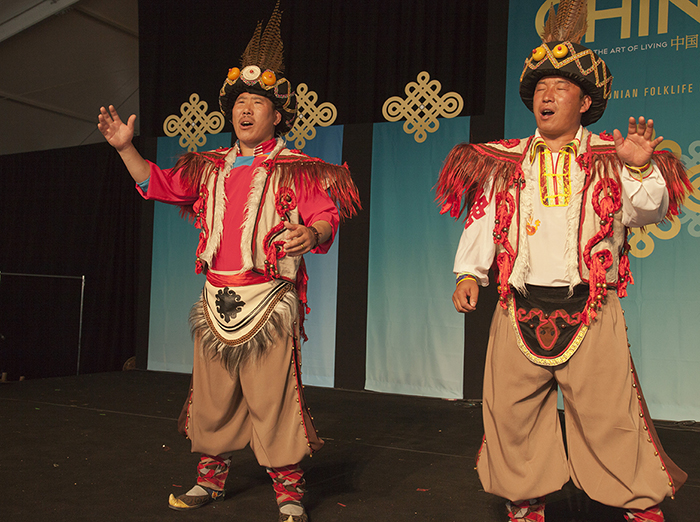Reviving a Culture with Qiang Folksongs

In February of this year, China program coordinator Jing Li visited Songpan County in Sichuan Province to talk with Zewang Renqing and Geluo Zhaxi, the artists and brothers who performed Qiang polyphonic singing at this year’s Folklife Festival. In an excerpt from that interview, they discuss heritage, family, and the modern struggles traditional artists face.
How did you start singing?
I remember that when I was little, there was no road in our village, no cars, no electricity. The only entertainment for us was to gather together around a fire pit after a day of work, drinking wine. From very young, I have been listening to my parents sing and learning songs from them.
When I was around five years old, a folksong scholar, Wang Jingquan, came to our village to research . He visited many Qiang villages but didn’t find any song that touched him deeply, until my father sang a song for him with another person, a blind singer. The blind singer was in tears while singing, and Mr. Wang was in tears too. He told us that we must learn these songs from our parents.
In March 2006, Mr. Wang brought us to Chengdu (the capital of Sichuan Province). We were just going to go back home when he told us that there was a big opportunity: the national TV singing contest, “China Youth Singers Contest.” That year was the first time “indigenous singing” became a separate category.
I remember that there were more than six thousand singers who applied that year, and our number was 2,222. We were so nervous when we were waiting to go on stage. We sang a very popular song from our hometown called “Hayi Hala.” Halfway through the song, the judges all stood up. We won the bronze medal at that year’s competition.
What is the folk singing to Qiang people? What does singing mean to you?
The songs are all passed on through oral teaching. There is no score or written language to document them. There are songs to sing when you plough the fields. There are songs to sing when you are cutting the wheat. There are songs for going up and down the mountain. There are also songs for weddings and funerals. My brother and I can sing about seventy or eighty songs.
The form of singing can be male duet, mostly drinking songs; shali, a group polyphonic, also in two parts, which can be sang by man and women; or singing and dance, guozhuang. Usually the party starts with an “opening the wine pot” ceremony, led by the most senior male, to pay tribute to the gods in the sky and the ancestors. Then, this senior member starts the first sip from the pot with a bamboo straw (za wine).
Our stage name is Biman Brothers, which means “parents” in the Qiang language. We chose this name to show that we sing the songs of our parents and ancestors.
What kind of efforts are you making to preserve the folk singing traditions in your community?
After we won the prize at the youth singers competition, local people’s recognition of Qiang culture changed greatly. People started to pay attention to traditional costumes and customs. Xiaoxing Village is located at the border of Qiang and Tibetan autonomous regions in northwestern Sichuan Province. Before we won the contest, people have been using Tibetan hada, a white scarf, on special occasions. After we won the contest, people and even the government started to use a red scarf, which is used in the Qiang tradition, to honor guests and decorate the village. Also, there used to be no more than ten traditional Qiang costumes left in the village. Now every family has at least one full costume.
Nowadays, young people are not that interested in their own culture. We try to teach songs to young people at parties and gatherings, but few are willing to learn seriously. Most of them don’t sing at all. Wherever pop music goes, the local culture is ruined. It is important to learn new things, but one must not lose the culture of his or her own people.
See a video of the Biman Brothers at the Folklife Festival.
This interview has been translated and condensed. Most answers were provided by Zewang Renqing. For more about the Biman Brothers, see Qiang Polyphonic Singing.

